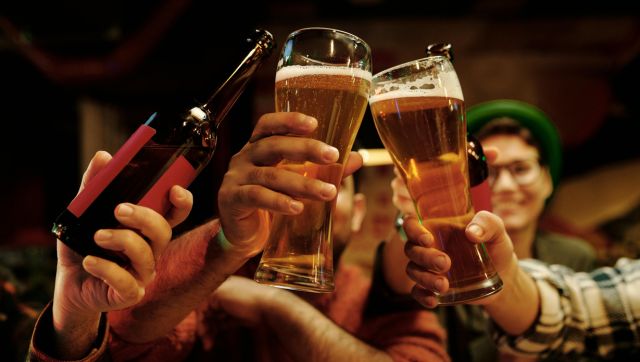It’s the season for Christmas parties and festive gatherings with family and friends.
You may find yourself drinking more than usual, thinking, “it’s the holidays” or “it’s that time of year.”
ALSO READ |
Do you find yourself sneezing during the holidays? It might be the Christmas tree syndrome
However, research indicates that more people die from heart complications between Christmas and New Year’s than at any other time of the year.
This increase may be linked to a condition known as ‘holiday heart syndrome’ – a serious medical issue.
‘Holiday heart syndrome’ refers to a range of cardiac complications, including atrial fibrillation, congestive heart failure, cardiac arrest, and heart attacks, that typically occur during or around winter holiday celebrations.
Excessive consumption of food and alcohol, which can elevate blood pressure, is a major factor, according to an article in Health Matters citing Dr William J Prabhu, a cardiologist and associate director at NewYork-Presbyterian Hudson Valley Hospital.
Prabhu explained, “Even for people who are normally careful about their salt, alcohol, and caloric intake, that caution tends to go out the window during holiday celebrations, which can be dangerous.”
Cardiac electrophysiologist Andrew Brenyo noted another pattern. “What tends to happen is after an afternoon or evening of heavy drinking, in the middle of the night or even the following morning, the patient will notice their heart is racing and they feel significantly different,” he told WCNC.
The condition was first identified nearly 50 years ago. In the 1970s, it was described as abnormal heart rhythms (arrhythmias) in otherwise healthy people after binge drinking alcohol, particularly during weekends and public holidays, including the festive season, according to The Conversation.
ALSO READ |
A Christmas miracle? Can mistletoe help treat cancer?
Alcohol is the main cause of the condition, as it impairs the heart’s ability to contract properly, disrupting blood circulation. Individuals with diabetes, obesity, heart failure, or a family history of atrial fibrillation (A-fib) or heart disease are at the highest risk.
However, binge drinking isn’t the only cause. A diet rich in saturated fats and sodium – common in holiday indulgences – has also been linked to heart conditions like atrial fibrillation, contributing to the syndrome.
According to the WCNC report, if you experience symptoms such as a racing heart, chest discomfort, or shortness of breath, you should stop drinking immediately.
Prabhu told Health Matters that someone experiencing holiday heart syndrome may feel heart palpitations, chest pain or discomfort, exhaustion, shortness of breath, and leg swelling.
While ‘holiday heart syndrome’ usually resolves on its own, if the symptoms persist, you should seek medical attention without delay. Research has shown that delays in seeking treatment during the holidays may lead to fatal outcomes.
These symptoms are typically temporary and clear up within 12 to 24 hours of onset in over 90 per cent of cases. However, this is not a reason to ignore or minimise them. Once you experience alcohol-related atrial fibrillation, there is a one in five to one in three chance of it occurring again, particularly if you continue drinking.
Blake Smith, a cardiac electrophysiologist at the University of Alabama at Birmingham (UAB) Cardiovascular Institute, said in an article last year, “While enjoying the holidays is important, moderation is key to keeping it heart-healthy,” Smith said.
“Staying hydrated and not neglecting regular physical activity will also help.”
ALSO READ |
Red wine can give you a headache. Here’s why
Since holiday heart syndrome largely arises from behavioural changes that influence risk factors, treatment depends on the individual’s cardiac issue and symptoms.
According to Health Matters, doctors might administer blood thinners or beta blockers to prevent blood clots and control heart rate, or they might use a brief electric shock to restore a regular heartbeat, among other therapies.
ALSO READ |
Do you constantly google diseases and health trends? You are likely to have IDIOT syndrome
There is no specific number of drinks proven to trigger holiday heart syndrome, so the most effective way to prevent it is to avoid binge drinking.
Australian guidelines recommend that both men and women limit alcohol consumption to no more than ten standard drinks per week and no more than four standard drinks on a single day. If you choose to drink, it is advisable to pace yourself and alternate alcoholic beverages with water.
As we grow older, the accumulation of risk factors increases the likelihood of developing health problems. Practising moderation is crucial – you can still enjoy and celebrate with your loved ones without crossing into excess.
Smith, in an article for UAB News, also suggested limiting the intake of fatty, sugary, and salty foods and avoiding overeating. While caffeine has not been definitively linked to an increased risk of atrial fibrillation when consumed in normal amounts, he recommended avoiding excessive caffeine intake, particularly for those sensitive to its effects.
Smith also said that seeking medical attention without delay if something feels wrong is important. “When it comes to the heart, timely evaluation and treatment can make a big difference,” he said.
Link to article –



